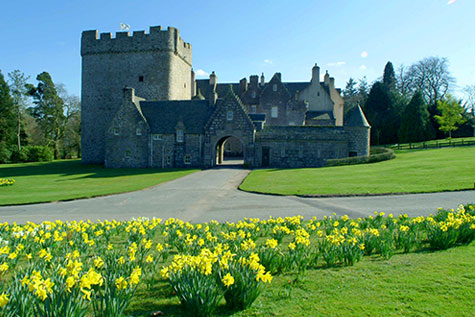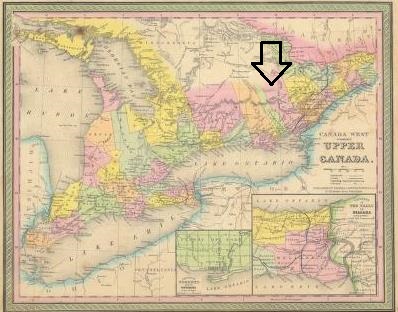Alexander McDonell
A reader (Mary W.) asked me about her relation, Alexander McDonell (or McDonald).
Alexander was born in Ireland in 1821 and arrived in Frontenac County, Ontario, Canada is 1852 (or thereabouts). He arrived with his wife Susanne Irvine (born in the early 1830s) and perhaps his nephew (also Alexander, born 1840 or so).
They were Presbyterians, and possibly from County Down or Antrim. They sailed to Canada from Dublin, since there were some ‘dangerous’ but undefined encounters in Belfast. They evidently had some land and money while in Ireland.
This is not a lot to go on. With some more facts, I might be able to figure out a few more things about Alexander. Here are some thoughts, though.
Alexander was probably Scots-Irish. For a millennium or so after St. Patrick, Ireland was nearly 100% Catholic. The English introduced, and tried to mandate, the Anglican faith in the 16th Century. With the subsequent penal laws, it was very difficult for Catholics to own or transfer land or hold official positions (such as sheriff or magistrate). Most Catholic Irish clung to their faith, but many of them became Anglicans. Irish Catholics referred to these folk as ‘jumpers’.
Protestant notions of religion caught on in Scotland, and the Presbyterians became the dominant group. Scottish law made the Presbyterian Church of Scotland the official church of the nation. Scottish Catholics were persecuted, and many forced to become Presbyterians. (In some cases, their only alternative was hanging.)
Many Scottish Presbyterians moved into northern Ireland in the 17th and 18th Centuries. Many descendants remain there today.
There was little or no incentive for Irish Catholics to become Presbyterians. Presbyterians were, at times, subject to the same penal laws as Catholics (although they were not as strictly enforced against non-Anglican Protestants). And the Presbyterian clergy did little to encourage conversion. They made little effort to tie religion or Biblical lessons to everyday life. In church, they simply read (in English, not Gaelic) from the Book of Common Prayer. Even Presbyterians didn’t feel especially good about religion. They went to church and followed the church rules because they feared eternal damnation if they didn’t.
While Irish Catholic jumpers became Anglican, very few jumped to the Presbyterian church. Since Alexander was a Presbyterian, I suspect that his ancestors came to Ireland from Scotland in the 17th Century or thereafter.

I only spent a brief moment researching the Irvine family name. The name originated from a clan in the Lowlands of Scotland. This again suggests that Alexander and Suzanne, or their ancestors, migrated first from Scotland to Ireland, and then to Canada.
The photograph in the corner is of Drum Castle, for centuries the home of the chief of Clan Irvine. Photograph courtesy of the National Trust for Scotland.
For reasons explained in ClanDonnell, I give almost no credence to the spelling of the last name. Irish and Scottish last names were, at one time, all in Gaelic. They were converted to English by people at various levels of literacy in either language. I’ve seen virtually every Gaelic last name spelled at least a dozen different ways in English.
The Gaelic MacDomhnaill, for example, has been spelled McDonald, McDonnell, and McDonell, and as often with the prefix ‘Mac’. Less obvious spellings include McDonyl, McDonnyll, McConnell, and McDaniel, to name but a few.
The name with the ‘d’ ending was more common in Scotland than in Ireland. And many members of the clan branch in Keppoch, Scotland, spelled the name McDonell, with a single ‘n’.
You may have noticed that we are building a case here that Alexander was Scots-Irish.

For those of you unfamiliar with Canadian geography, Frontenac County is in Ontario along the north shore of the St. Lawrence River at the point at which Lake Ontario flows into the river. Ontario was then known as Upper Canada. This map is from the late 1840s.
I’d love to research Irish and Scottish settlements in Frontenac County and I’ve put it on my “to do” list. In the meantime, if any of you have any information about Alexander or Frontenac, please let me know. I will post your input here.
If, in fact, Alexander came from a family with land and money, it didn’t mean much by 1852. I cannot summarize the devastating effect of the Great Hunger in a few sentences. I devoted several chapters to it in ClanDonnell. It’s likely that Alexander and Susanne had much in common with other survivors of the Hunger. They survived, but saw little future in Ireland. And they saw hope in North America.
There is also a story as to why Alexander and family sailed from Dublin instead of Belfast. I just don’t know what it is.
